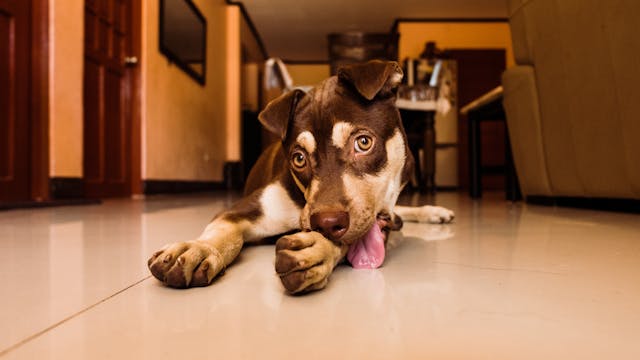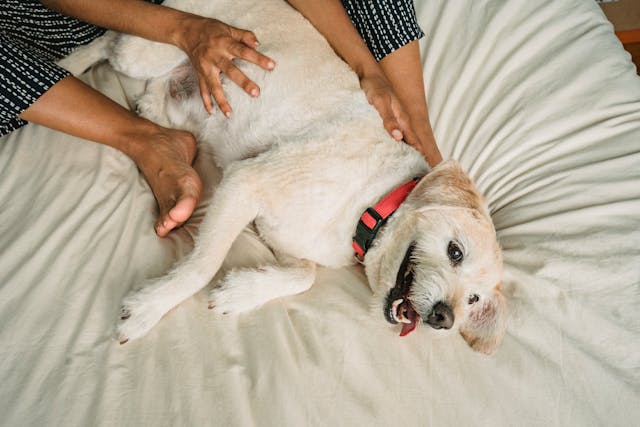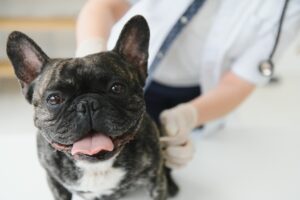Dogs lick their paws for regular reasons—cleaning up or exploring. But when it gets excessive or obsessive, it’s time to figure out what’s going on. Let’s show you the reasons behind this behavior.
5 Reasons Why Your Dog Will Lick Their Paws Excessively
Here are five reasons why your furry pet will lick their paws too frequently:
1. Pain or Injury
A sore paw is one of the most common causes of constant licking. Your dog’s paws can get hurt in all kinds of ways—stepping on sharp objects, cracking their pads on hot pavement, or even breaking a nail. Burns from road salt in winter or stings from insects can also irritate.
If you spot swelling, limping, or see your pup avoiding stairs, it’s time to check for cuts, ingrown nails, or other injuries.
2. Pesky Fleas or Ticks
Fleas and ticks don’t just make your dog itchy—they can drive them to lick and bite their paws nonstop. These parasites love hiding in the cozy spaces between toes or under fur.
Look for small, moving bugs or tiny black specks (flea dirt). Ticks are sneaky, too, often hiding where they’re hard to spot. If you find one, carefully remove it using tweezers or a tick removal tool to avoid leaving any parts behind.
Regular flea and tick preventatives can save your dog (and you) from this hassle altogether.
3. Allergies
Dogs can be allergic to just about anything—food, grass, pollen, or even your laundry detergent. Allergies often make their skin itchy and inflamed, leading to red, irritated paws.
If your dog’s licking is paired with scratching or hot spots, allergies might be the culprit. Depending on the cause, your vet may recommend medication, special diets, or even medicated shampoos to keep your dog comfortable.
4. Arthritis
If your older dog is licking their paws and moving a bit slower, arthritis could be to blame. This condition makes their joints (even in the toes) stiff and painful.
You can help by providing cozy orthopedic beds, keeping their weight in check, and adding low-impact exercise to their routine.
If needed, your vet can prescribe supplements or pain medication to improve their quality of life.
5. Boredom or Stress
Sometimes, licking isn’t about the paws at all—it’s about what’s going on in your dog’s mind. Dogs might lick out of habit, boredom, or stress.
If there’s no injury or infection and they’re still at it, anxiety or even obsessive-compulsive tendencies could be the reason.
Keep them engaged with toys, regular walks, and playtime. For severe cases, your vet might suggest behavioral training or calming aids.

What to Do When Your Dog Licks Their Paws Non-stop
If your dog won’t stop licking their paws, it’s important to address it quickly to prevent further irritation or injury.
Here’s a step-by-step guide on what to do:
Inspect Their Paws
Check for visible issues like cuts, swelling, redness, foreign objects (like burrs or splinters), or signs of parasites such as fleas or ticks.
Look between the toes and under the paw pads for anything unusual.
Clean and Soothe
If there’s no obvious injury, clean their paws gently with warm water and dry them thoroughly.
You can also use a pet-safe antiseptic wipe to remove any irritants like dirt or allergens.
Rule Out Allergies
Licking could be triggered by environmental or food allergies.
Consider recent changes, like new treats, cleaning products, or exposure to grass or pollen. Your vet may suggest adjusting their diet or allergy medications if needed.
Watch for Signs of Infection
Yeast or bacterial infections often make paws red, itchy, and smelly.
If you notice these signs, a home remedy like a diluted vinegar soak might help temporarily, but it’s best to consult your vet for proper treatment.
Address Behavior or Stress
Sometimes, paw licking is due to boredom, stress, or anxiety. Keep your dog mentally and physically stimulated with regular walks, playtime, and interactive toys.
If licking persists, talk to your vet about behavioral training or calming aids.
Seek Veterinary Help
If you can’t identify the cause or the licking leads to raw or bleeding skin, consult your vet.
They can diagnose the issue, whether it’s allergies, an infection, or an underlying condition like arthritis, and provide appropriate treatment.
How Your Vet Addresses Excessive Paw Licking
If your dog is persistently licking their paws, your vet will start with a thorough examination and ask about your dog’s history.
Based on the findings, they’ll recommend treatment tailored to the root cause:
Topical Treatments
For irritation or minor infections, they may prescribe medicated foot soaks, sprays, or ointments. These can help soothe the area and address the underlying problem.
Oral Medications
If your dog has a bacterial infection, they may need antibiotics. Your vet will prescribe antifungal medications to tackle yeast infections effectively.
Surgical Intervention
If a foreign object, cyst, or other growth is found, your vet might recommend surgery to remove it and repair any damage.
Specialist Referrals
For complex or unresolved issues, your vet may refer you to a vet dermatologist or surgeon for advanced care.
Behavioral Solutions
If no physical cause is identified, your dog may be licking its paws due to behavioral issues like stress or boredom.
In this case, your vet might recommend behavioral training, increased mental stimulation, or anxiety management strategies.

Home Remedies for Excessive Paw Licking
If your dog is licking their paws and you’re considering home remedies, it’s always smart to check with your vet first.
Sometimes, a little DIY care can help soothe irritation, but the wrong approach could make things worse.
Here are a few vet-approved remedies to try at home:
For Dry or Cracked Paws
If your pup’s paw pads are dry or cracked, you can apply a small amount of coconut oil or a specialized paw balm.
These can moisturize and soften their skin, helping to heal minor damage and prevent further irritation.
For Yeast Infections
A simple soak can help treat paw infections caused by yeast. Mix three parts of water with one part of white or apple cider vinegar in a tub.
Let your dog’s paws soak for about 10 minutes, then rinse and dry thoroughly. This can help balance the skin’s pH and reduce the growth of yeast.
For Itchy Paws
If your dog’s paws are itchy from minor irritation or allergies, try an oatmeal soak. Grind plain, unsweetened oats into a fine powder and mix it with warm water in a tub.
Let your dog’s paws soak for about 10 minutes, then rinse and pat them dry. Oatmeal is naturally soothing and can help calm itchy skin.
Remember to keep your dog’s paws clean and dry after using any of these remedies. If the licking persists or worsens, consult your vet for a deeper look at what’s causing the problem.
Truffle Paws Has You Covered for Emergencies
At Truffle Paws, we know how stressful it can be when your dog constantly licks their paws, and you’re unsure what’s causing it. From allergies to infections or injuries, paw problems can quickly escalate into costly emergency vet visits.
That’s why our comprehensive insurance plans are designed to help you get the care your dog needs—without the financial stress.
Don’t wait until excessive licking leads to serious issues. With Truffle Paws, you can focus on finding the right treatment while we handle the unexpected costs.
Contact our customer service team today to learn how we can protect your dog—and their paws—when it matters most.






